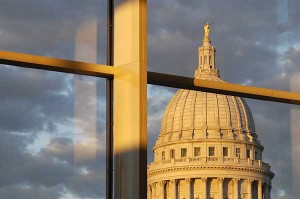 State Budget
State Budget
After an almost three-month delay, Governor Scott Walker signed the $76 billion 2017-19 state budget into law on September 20. He made 98 partial vetoes that went unchallenged by the Legislature. PROFS joined other campus advocates in successfully advocating for new state funding – including funding for faculty and staff pay raises – in many years.
At the same time, PROFS is very concerned about two provisions added to a wrap-up omnibus motion without discussion:
Faculty workload: This provision requires the University of Wisconsin System Board of Regents to create a policy that monitors faculty and instructional academic staff teaching loads. Each institution is also required to develop a policy to reward those that exceed standard (not defined) workloads. Chancellor Blank has indicated she thinks it is important to report all aspects of workload: research, outreach and teaching.
UW Chancellor and President qualifications: The wrap-up motion modified language previously passed by the Joint Finance Committee. The final language prohibits individual institutions from having a policy that requires chancellors to hold a tenured faculty position. UW-Madison Faculty Polices and Procedures (FP&P) currently requires the Chancellor and Provost to have tenure.
Budget highlights:
- Extension of the current four-year tuition freeze for two additional years.
- $26.3 million in outcomes-based funding. Regents will create metrics to measure progress toward goals. The governor used his veto pen to keep UW institutions from choosing which metrics will be used to measure progress.
- $5 million for high-demand degree programs.
- $3 million for the creation of the UW-Madison Tommy G. Thompson Center on Public Leadership.
- $10,000 for the review of policies related to academic freedom.
- $980,000 for UW Hospital and Clinics Carbone Cancer Center.
- $200,000 for the Rural Physician Residency Assistance Program.
- $100,000 for UW-Madison’s Alzheimer’s Disease Research Center.
- Creation of an engineering school at UW-Green Bay.
- Language that bars individual institutions from adopting a policy that would require chancellors and vice chancellors to have tenure or hold a terminal degree in their field.
- Expansion of tuition free-education programs for veterans and their families.
PROFS had deep concerns about policy items in the budget and asked the co-chairs of the finance committee and the governor to remove language relating to the qualifications for UW System President and Chancellor candidates and to amend the language creating the Thompson Center to eliminate the leadership board, allow for the creation of an advisory committee, and ensure the Thompson Center is subject to university governance. The full letter is here.
Regent Administrative Hiring Workgroup
A workgroup created by UW System Board of Regents President John Behling was tasked with review of UW System Chancellor and other top administrative positions (see above). Behling told fellow Regents earlier this year he would like UW System institutions to recruit non-academic candidates and “streamline” the hiring process for top administrative positions.
The group, which does not include a member from UW-Madison, is examining hiring practices and discussing expanding the search process to include non-traditional candidates from outside academia. The workgroup’s draft findings were released last week and Regents are expected to vote on the documents at their October meeting. PROFS met with Regent Drew Petersen, chair of the workgroup, earlier this summer to share UW-Madison faculty concerns. Peterson told PROFS he welcomes input from an ad hoc UW-Madison committee and will work with PROFS on strategy related to working with legislators and the governor on this topic.
AB 299, relating to campus speech
This bill, which passed the Assembly Colleges and Universities Committee on a partisan vote, requires the Board of Regents to adopt a policy on free expression for all campuses. Under this bill, university administrators would be required to punish students who disrupt campus speakers. The bill would also require campuses to remain neutral on public policy issues. PROFS is registered in opposition to the legislation. Our statement on the bill is on the here.
Campus Carry
Supporters of campus carry have said they intend to introduce legislation allowing concealed weapons on campus, but nothing has been introduced to date. PROFS is opposed to campus carry and continues to carefully monitor the issue.
Fetal Tissue
Republicans who control the legislature appear to be split on legislation relating to the use of fetal tissue in scientific research. Two different bills have been introduced, one that follows existing federal law forbidding the sale of fetal tissue, but not research that uses it, and one that bans research using fetal tissue from abortions performed after January 1, 2017 and imposes hefty fines on anyone who uses the material. PROFS has assembled a working group comprised of faculty and industry representatives to advise us on this issue.
Foxconn
In July, Taiwanese manufacturer Foxconn and Governor Scott Walker announced Foxconn’s intention to build a liquid crystal display manufacturing plant in Wisconsin. Wisconsin would provide $3 billion in state incentives over 15 years to Foxconn. The plant could ultimately provide 13,000 Foxconn jobs and thousands of related jobs. Legislation authorizing a financial package was signed into law September 18. Chancellor Rebecca Blank met with leaders of Foxconn prior to the announcement to discuss the advantages of locating such a facility near a major research institution like UW-Madison. Her statement on Foxconn is on the UW here.
